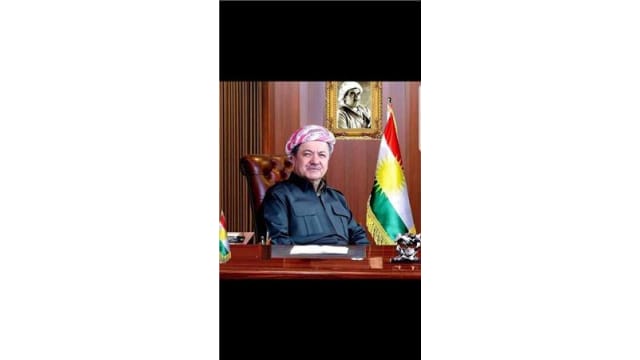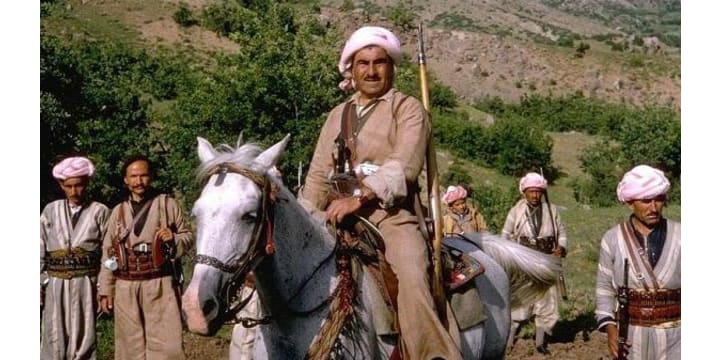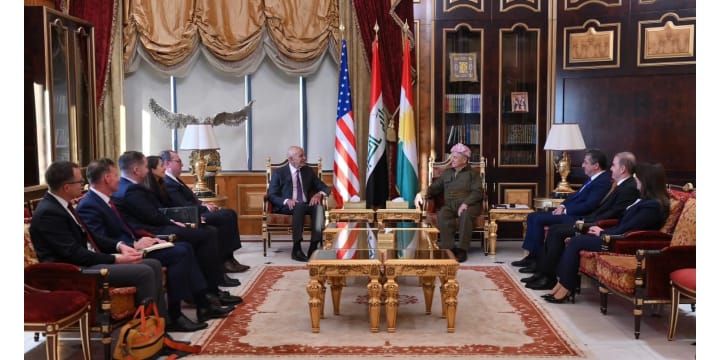
President Barzani: First, the referendum is not a crime. A people who wished to exercise their rights and express their will in a peaceful and democratic civil manner.
BBC: What do you think about Afrin operations?
President Barzani: We are very concerned and hope that this process will end quickly because the problems can not be treated by wars and fighting.
BBC: In your opinion, would the Peshmerga have any role in this war? Will you send the Peshmerga to help the YPG forces?
President Barzani: Sending troops from the Peshmerga does not address the problem, the best help we can provide is to try to stop these attacks on Afrin as soon as possible.
BBC: After 2003 was talked about the Kurdistan Region as a success story. The Kurds were developing and thriving in all areas of life, but they lost that development and recovery. Do you think that you have risked and did not succeed?
President Barzani: I also said earlier that I do not regret and confirm now that we do not regret the vote of 3 million citizens yes. I think the referendum was successful, more than 93% of the citizens of Kurdistan voted yes.
BBC: You say it was successful, but the reality is different, because the Kurds were hurt after the referendum and you did not achieve independence?
President Barzani: I do not think it is true that there are those who say that what happened was because of the referendum, that the problems that began before 2014 and the war against Daqash also, and about two million displaced to Kurdistan when we were facing those problems alone, and the majority of the people of Kurdistan with this trend, So why call it a failure ?.
BBC: America and the international community have told you that the time is not right for the referendum. If we go back a little for months, do not you think it would have been better to listen to the advice of the United States?
President Barzani: First, the referendum is not a crime. A people who wished to exercise their rights and express their will in a peaceful and democratic civil manner. Those who said that the time is not suitable for the referendum did not provide us with any alternative, they did not provide a convincing alternative for the people of Kurdistan. We do not consider the referendum to be a crime; it is a democratic exercise that any people has the right to conduct.
BBC: But as a result you lost control of Kirkuk and some other areas, do not you believe that what happened was wrong?
President Barzani: I do not consider this a mistake and I do not regret it, and what happened in Kirkuk was because of internal Kurdish betrayal. Before the referendum, I have repeatedly stressed that we must make Kirkuk a model city for national, religious and sectarian coexistence.
BBC: I talked about betrayal among the Kurds, is this a sign that the Kurds do not agree with each other? We spoke in Hawler and Kirkuk with the people, they express their pain about those events that took place in Kirkuk, and that they were affected both physically and financially. They regard the government of Baghdad as well as the Kurdish officials and say that what happened was because of the internal Kurdish conflict.
President Barzani: Before the referendum also was talking about this dispute, but in fact a very large proportion of citizens participated in the referendum and voted 93% of them yes. Those who regard the Kurdish leadership now also had an apology for him. If a people demands freedom and independence, he must pay the tax without doubt. If it was not treachery of the Kurds, these events did not happen. He also stated in the permanent Iraqi constitution that "adherence to this constitution is a guarantee of the unity of Iraqi land."
BBC: If you recognize that what happened in Kirkuk was part of it because of the internal dispute of the Kurdish leadership?
President Barzan: The referendum was not a decision of a party, a person or a party in itself. The decision of all the Kurdish parties as well as the Parliament of Kurdistan since 2014 and all the parties were with the referendum. There is a possibility that some people were not with the referendum, but no one came to say I'm against.
What happened in Kirkuk was a betrayal of a junta, otherwise all Kurdish parties and forces would be with the referendum.
BBC: Who betrayed you?
President Barzani: The people of Kurdistan and the international community all know who these are.
BBC: There are those who say that the referendum was by no means for the national rights of the Kurds. But the main objective was to hold on to power and control of oil resources.
President Barzani: 93% of the people of Kurdistan voted yes, if no importance to what others say about the referendum.
BBC: What about the fate of Kirkuk? After a three-year visit, the Peshmerga forces were responsible for protecting the security of Kirkuk and its oil. Now there are many questions about Kirkuk. Will the Iraqi forces remain in this city?
President Barzani: The dialogue continues, and we think it is better to address the issue of Kirkuk and other areas outside the administration of the territory currently occupied, dialogue.
BBC: If you think Kirkuk is occupied?
President Barzani: Yes, it is occupied now.
How close are you to finding a solution to the joint administration of Kirkuk?
President Barzani: Dialogue is continuing and I hope to reach a common agreement. But we are in no way accepting the policy of imposition and imposition of fait accompli.
What would you do if negotiations and dialogue failed?
PRESIDENT BARZANI: If it does not work, then what will happen and we do not want to anticipate events?
BBC: Do you expect war and fighting in Kirkuk? Is this a major concern for citizens?
President Barzani: No, we have never been with the war, and we seek to reach a solution and a joint agreement. The referendum was held with the aim of preventing war and not taking a pretext.
BBC: Do you think this is the last hope for the Kurds to reach an independent state? Or will you try again? Not only in Iraq, what do you think about the future of Kurds in the region?
President Barzani: No, we will not give up independence in any way.
BBC: Are they worried that the violence in Kirkuk and other areas in northern Iraq is paving the way for renewed recovery?
President Barzani: Everyone knows without the help of the Peshmerga of the Iraqi forces, they could not liberate Mosul, it is a fact, certainly that what happened in Kirkuk paved a lot for Daish, where it is not correct to say that the da'eef is over.
BBC: This means that you do not think that a preacher has ended. What are you going to do about it?
Barzani: For us, fighting terrorists under any name is a priority, and we do not allow the return of dupes and emergence in the areas under our control. But a war that is not only military, but also political and cultural.
BBC: You gave up your position, when will the presidential elections take place, is there someone in your mind who is suitable for the presidency?
President Barzani: I respect the law and according to law the term of the presidency of the region for me ended, and according to the law, every citizen who meets the conditions can be nominated for this position. As for the date of the elections, we are still in discussions and discussions to determine the date of the elections.
BBC: What will you do in the future? Will you stay in پششمرگة?
President Barzani: I was and still is a Peshmerga and I will stay.

